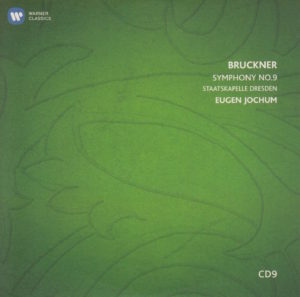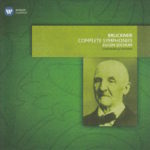 This morning’s conductor of Anton Bruckner’s unfinished Symphony No. 9 in D Minor WAB 109 (dedicated “to the beloved God”) is German-born Eugen Jochum (1902-1987), without question one of the most highly respected interpreters of Anton Bruckner’s music who ever lived.
This morning’s conductor of Anton Bruckner’s unfinished Symphony No. 9 in D Minor WAB 109 (dedicated “to the beloved God”) is German-born Eugen Jochum (1902-1987), without question one of the most highly respected interpreters of Anton Bruckner’s music who ever lived.
I own two CD box sets with performances conducted by Jochum – this one, on the Warner Classics label (I call it the “Green Box”), and another on the DG label (I call it the “White Box”). I chose to listen to the symphony from the DG “White Box” first because the recordings are older. (I figured alpha by conductor name, then chronological order by performance date was reasonable way to structure this project.)
The orchestra today, in the “Green Box,” is Staatskapelle Dresden.
To date, I have been privileged to hear 16 performances conducted by Maestro Jochum – eight from the “White Box” and right from the “Green Box.”
As I’ve discovered, I prefer one of those box sets over the other.
But I’ll save the subjective stuff for later.
First, the objective stuff.
I first encountered Eugen Jochum in my 144-day project on Day 7, Symphony No. 1 (Green Box)
Then again on Day 23, Symphony No. 2 (Green Box).
Then again on Day 39, Symphony No. 3 (Green Box).
Then again on Day 55, Symphony No. 4 (Green Box).
Then again on Day 71, Symphony No. 5 (Green Box).
Then again on Day 87, Symphony No. 6 (Green Box).
Then again on Day 103, Symphony No. 7 (Green Box).
Then again, most recently, on Day 119 (Green Box).
That’s the past.
Now, here are the objective aspects of today’s recording:
 Bruckner’s Symphony No. 9 in D Minor WAB 109, composed 1884-1890
Bruckner’s Symphony No. 9 in D Minor WAB 109, composed 1884-1890
Eugen Jochum conducts
Jochum used “ed. Nowak,” according to the CD sleeve
Staatskapelle Dresden plays
The symphony clocks in at 60:44
This was recorded in Dresden, Germany, in 1976
Jochum was 76 when he conducted it
Bruckner was 72 when he died before finishing the Ninth
This recording was released on the Warner Classics label
Bruckner wrote his symphonies in four parts. He would have this time, too. But he died before completing movement four. The time breakdown of this one (Symphony No. 9 in D Minor), from this particular conductor (Jochum) and this particular orchestra (Staatskapelle Dresden) is as follows:
I. Feierlich, misterioso (D minor)…………………………………………………………………23:06
II. Scherzo. Bewegt, lebhaft (D minor); Trio. Schnell (F-sharp major)…………………………………………………………………………………………………………….9:58
II. Adagio. Langsam, feierlich (E major)……………………………………………………….27:39
IV. Finale. (D minor, incomplete)……………………………………………………………………0:00
Total running time: 60:44
Now, the subjective aspects.
My Rating:
Recording quality: 3
Overall musicianship: 3
CD liner notes: 3 (minimal information, one essay)
How does this make me feel: 3
The horns sound pinched, tinny, and thin. Like kazoos.
In fact, this recording has a “tight” sound to it. Like it was squeezed.
I’m not saying it was recorded badly. Or remastered recklessly.
I’m saying (well, typing) that this feels funny to me. It’s a chore to listen to it.
The end result is that even though this performance is five seconds less than the one I heard conducted by Jochum yesterday, it sounds and feels about five times longer.
Some of the Scherzo is interesting – the pizzicato, for example. And the flutes.
But the horns are piercing to my ears. Example: Around the 6:50 mark. When the staccato rhythm appears. The horns make me wince. Same thing happens to me in the first 2-3 minutes of the Misterioso, too. The horns are rattling.
Still, no matter how much this sounds “off” to my ears, the final 2-3 minutes of the Adagio uplift me tremendously.
So I can’t give this two thumbs down. Maybe one thumb up and one thumb half way between up and down.
I would recommend this only if no other recordings of Bruckner’s Ninth were available.
